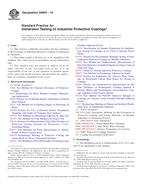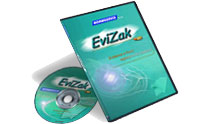Potrebujeme váš súhlas na využitie jednotlivých dát, aby sa vám okrem iného mohli ukazovať informácie týkajúce sa vašich záujmov. Súhlas udelíte kliknutím na tlačidlo „OK“.
ASTM D6943-10
Standard Practice for Immersion Testing of Industrial Protective Coatings
Automaticky preložený názov:
Štandardná prax pre ponor testovanie priemyselného Protective Coatings
NORMA vydaná dňa 1.2.2010
Informácie o norme:
Označenie normy: ASTM D6943-10
Poznámka: NEPLATNÁ
Dátum vydania normy: 1.2.2010
Kód tovaru: NS-37087
Počet strán: 6
Približná hmotnosť: 18 g (0.04 libier)
Krajina: Americká technická norma
Kategória: Technické normy ASTM
Anotácia textu normy ASTM D6943-10 :
Keywords:
chemical, concrete, cycling, evaluation, immersion, panels, steel, temperature gradient, testing, Chemicals, Contamination--coatings, Degradation--paints/related coatings/materials, Immersion--coatings, Protective coatings, ICS Number Code 25.220.99 (Other treatments and coatings)
Doplňujúce informácie
| Significance and Use | ||||||||||||||||||||||||||||||||||||||||||||||||||||||||||||||||
|
Protective coatings are used on metallic and concrete storage and processing vessels, shipping containers, dams and rail cars to protect the substrate from corrosive attack and to protect stored materials (cargo) from contamination. This method provides a means to assess the ability of a protective coating to resist degradation by chemicals and to protect the liquid cargo from contamination by either the substrate or coating, based on visual observations. Other measures of degradation, such as changes in weight or dimensions of the coating material, or chemical changes to the cargo, may be used to assess this protective ability as mutually agreed upon between contracting parties. This standard practice covers three approaches to conducting evaluations of a lining coating materials fitness for purpose. Method A—Evaluation of specimens under conditions of constant temperature at atmospheric pressure, (that is, without a thermal gradient). Method B—Evaluation of specimens under conditions which provides a temperature gradient across the sample: The temperature may increase from coated side to uncoated side (Method B1) or decrease from coated side to uncoated side (Method B2). Method C—Evaluation of specimens under conditions of constant temperature and increased pressure, (that is, without a thermal gradient). Exposure of materials of known performance (a control) at the same time as the test material is recommended. |
||||||||||||||||||||||||||||||||||||||||||||||||||||||||||||||||
| 1. Scope | ||||||||||||||||||||||||||||||||||||||||||||||||||||||||||||||||
|
1.1 This practice establishes procedures for the evaluation of the resistance of industrial protective coatings to immersion in chemicals. 1.2 The values stated in SI units are to be regarded as the standard. The values given in parenthesis are for information only. 1.3 This standard does not purport to address all of the safety concerns, if any, associated with its use. It is the responsibility of the user of this standard to establish appropriate safety and health practices and determine the applicability of regulatory limitations prior to use. |
||||||||||||||||||||||||||||||||||||||||||||||||||||||||||||||||
| 2. Referenced Documents | ||||||||||||||||||||||||||||||||||||||||||||||||||||||||||||||||
|
Odporúčame:
EviZak - všetky zákony vrátane ich evidencie na jednom mieste
Poskytovanie aktuálnych informácií o legislatívnych predpisoch vyhlásených v Zbierke zákonov od roku 1945.
Aktualizácia 2x v mesiaci !
Chcete vedieť viac informácii ? Pozrite sa na túto stránku.




 Cookies
Cookies
